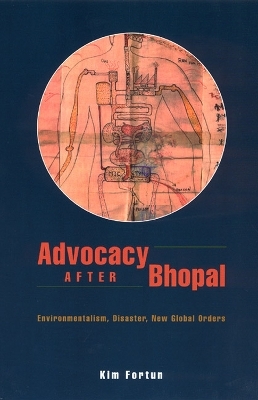
Advocacy after Bhopal
Environmentalism, Disaster, New Global Orders
Seiten
2001
University of Chicago Press (Verlag)
978-0-226-25720-4 (ISBN)
University of Chicago Press (Verlag)
978-0-226-25720-4 (ISBN)
In exploring the worldwide political and environmental aftermath of the Bhopal disaster in 1984, this text discusses various differing claims by focusing on the dynamics and paradoxes of advocacy in competing power domains.
The 1984 explosion of the Union Carbide chemical plant in Bhopal, India was undisputedly one of the world's worst industrial disasters. Some have argued that the resulting litigation provided an "innovative model" for dealing with the global distribution of technological risk; others consider the disaster a turning point in environmental legislation; still others argue that Bhopal is what globalization looks like on the ground. Kim Fortun explores these claims by focusing on the dynamics and paradoxes of advocacy in competing power domains. She moves from hospitals in India to meetings with lawyers, corporate executives, and environmental justice activists in the United States to show how the disaster and its effects remain with us. Spiraling outward from the victims' stories, the innovative narrative sheds light on the way advocacy works within a complex global system, calling into question conventional notions of responsibility and ethical conduct. Revealing the hopes and frustrations of advocacy, this moving work also counters the tendency to think of Bhopal as an isolated incident that "can't happen here."
The 1984 explosion of the Union Carbide chemical plant in Bhopal, India was undisputedly one of the world's worst industrial disasters. Some have argued that the resulting litigation provided an "innovative model" for dealing with the global distribution of technological risk; others consider the disaster a turning point in environmental legislation; still others argue that Bhopal is what globalization looks like on the ground. Kim Fortun explores these claims by focusing on the dynamics and paradoxes of advocacy in competing power domains. She moves from hospitals in India to meetings with lawyers, corporate executives, and environmental justice activists in the United States to show how the disaster and its effects remain with us. Spiraling outward from the victims' stories, the innovative narrative sheds light on the way advocacy works within a complex global system, calling into question conventional notions of responsibility and ethical conduct. Revealing the hopes and frustrations of advocacy, this moving work also counters the tendency to think of Bhopal as an isolated incident that "can't happen here."
Kim Fortun is an associate professor in the Science and Technology Studies Department at Rensselaer Polytechnic Institute.
| Erscheint lt. Verlag | 24.7.2001 |
|---|---|
| Sprache | englisch |
| Maße | 17 x 23 mm |
| Gewicht | 652 g |
| Themenwelt | Naturwissenschaften ► Biologie ► Ökologie / Naturschutz |
| Recht / Steuern ► EU / Internationales Recht | |
| Recht / Steuern ► Privatrecht / Bürgerliches Recht ► Berufs-/Gebührenrecht | |
| ISBN-10 | 0-226-25720-7 / 0226257207 |
| ISBN-13 | 978-0-226-25720-4 / 9780226257204 |
| Zustand | Neuware |
| Haben Sie eine Frage zum Produkt? |
Mehr entdecken
aus dem Bereich
aus dem Bereich
Lehrbuch zu Grundlagen, Technologie und Praxis
Buch | Hardcover (2022)
Hanser (Verlag)
34,99 €


